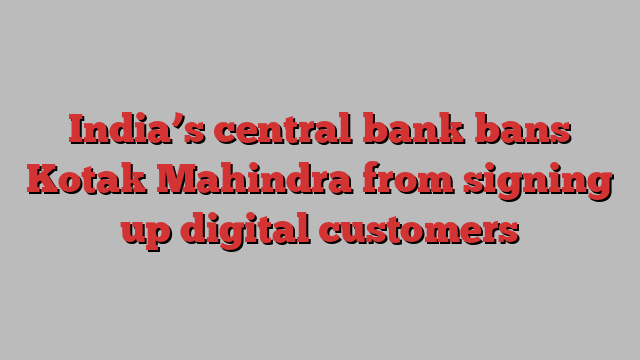
Stay informed with free updates
Simply sign up to the Indian business & finance myFT Digest — delivered directly to your inbox.
India’s central bank has banned Kotak Mahindra Bank from issuing credit cards or taking on new digital and mobile banking customers, marking the regulator’s latest crackdown on the country’s fast-growing consumer finance industry.
The Reserve Bank of India said it found “serious deficiencies” in IT risk and security governance over two consecutive years at Kotak Mahindra, a prominent private sector lender that was founded by Uday Kotak, one of India’s most influential financial figures.
The move to impose a ban — which can be reviewed if Kotak Mahindra remediates the problems — on critical business lines is more evidence of a step-up in enforcement for the RBI, which has previously tended to mete out fines. Restrictions on new business could ultimately have a far heavier impact.
The RBI said on Wednesday that it had decided to impose the restrictions despite “continuous high-level engagement with the bank on all these concerns”.
“The outcomes have been far from satisfactory,” the RBI said in a statement. “There has been rapid growth in the volume of the bank’s digital transactions, including transactions pertaining to credit cards, which is building further load on the IT systems.”
A Kotak Mahindra spokesperson said the bank has taken measures to strengthen its systems and will continue to work with the RBI to “swiftly resolve” the issues, adding that existing customers will continue to receive uninterrupted credit card, internet and mobile banking services.
The RBI has taken increasingly hawkish action on India’s booming retail lending and has moved aggressively to avert rising consumer debt and delinquencies. Growth in unsecured lending in India now forms nearly 10 per cent of total banking sector loans, according to S&P Global Ratings, which labelled the amount “excessive” in a March report.
Governor Shaktikanta Das warned banks to avoid “all forms of exuberance” after the RBI ordered lenders in November to increase the amount of capital they must have to mitigate against riskiness in personal loans they have extended.
The RBI’s action against Kotak Mahindra follows an order against Paytm in January, in which the leading payments platform was barred by the central bank from accepting new deposits, triggering a meltdown in its parent company’s share price and an organisational overhaul.
HDFC Bank, India’s largest private lender, was also hit with an RBI suspension on adding new credit card customers after regular tech outages in 2020. The ban was lifted about eight months later.
“These actions are a departure from the historically nominal financial penalties imposed for breaches,” according to S&P.
In 2017, Kotak Mahindra launched its digital banking service called 881, which now accounts for about 95 per cent of its personal loans by volume. But earlier this month the bank faced outages that saw customers struggle to make digital transactions and cash withdrawals.
Uday Kotak previously fought with the RBI in a decade-long clash over the size of his family’s stake in the lender, which was ultimately retained at 26 per cent.
In an interview last year with the Financial Times, Kotak, who stepped down as the bank’s chief executive in 2023 to comply with a 15-year regulatory term limit, praised India’s regulators “for protecting and nurturing” the country’s lenders.

